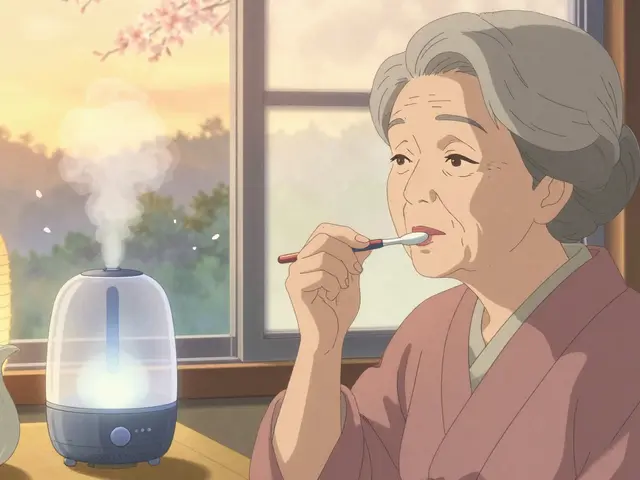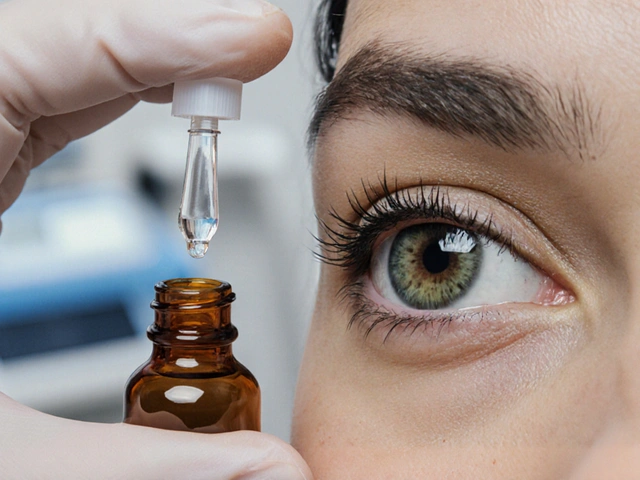Imagine looking in the mirror and noticing your hair is thinning more than before, or discovering a bald patch that wasn't there yesterday. That's the daily reality for many folks dealing with alopecia. But there's some good news on the horizon! Thanks to some amazing recent research, we're seeing a wave of new treatments that could change the game for hair loss.
First things first, let's break down what's happening here. Alopecia isn't just one thing; it's an umbrella term for different types of hair loss, some caused by genetics, others by immune system quirks. New studies are really diving into what triggers these conditions, and it turns out, there's more hope than ever.
- Understanding Alopecia
- Recent Breakthroughs in Treatment
- Gene Therapy: A New Frontier
- Innovative Topical Solutions
- Tips for Coping with Alopecia
Understanding Alopecia
Alright, so what's the deal with alopecia? It’s not just one-size-fits-all hair loss. No, alopecia is like a big family of conditions, and each has its own story. Broadly, alopecia refers to any form of hair loss, but some of the most common types you might hear about are Alopecia Areata, Androgenetic Alopecia, and Telogen Effluvium.
Alopecia Areata
Let’s start with the one that’s a bit of a mystery—Alopecia Areata. It's widely believed to be an autoimmune condition, which means your immune system decides to rebel against your hair follicles. This might lead to patchy hair loss, with circle-shaped bald spots cropping up here and there.
Androgenetic Alopecia
Then there's Androgenetic Alopecia, or as it's commonly known, male or female pattern baldness. It's the genetic one—the kind that's passed down through the family. This type often follows a predictable pattern, affecting the hair on top of the scalp while leaving the sides intact. Fun fact: it's the most common form of hair loss globally!
Telogen Effluvium
And don't forget about Telogen Effluvium. This one's an external stressor-induced type, where emotional or physical stress—think surgery or a traumatic event—pushes hair into a resting phase, leading to sudden shedding.
What's Really Happening?
So what's really going on with your hair? Well, normally, hair grows in cycles—growth, resting, and shedding. But in alopecia, these cycles get disrupted. In the case of alopecia areata, for instance, your immune system jumps the gun, attacking healthy hair follicles for no good reason. Meanwhile, in androgenetic alopecia, hair follicles shrink due to excess levels of certain hormones or increased sensitivity to them, leading to thinner strands.
Understanding these types is key to cracking the code on effective treatment. Knowing what's behind your specific form of hair loss opens the door to targeted therapies that truly work.
Recent Breakthroughs in Treatment
It feels like we're finally turning a corner on alopecia treatment, and it's about time! The recent breakthroughs are a testament to how far science has come in understanding hair loss. One of the most exciting developments has been the application of gene therapy in tackling alopecia. Researchers are targeting specific genes responsible for hair loss, offering a brand-new approach that's precise and promising.
But that's not all. Stem cell therapy is making waves too. By harnessing the power of undifferentiated cells, scientists aim to regenerate hair follicles. Think of it as a way to kickstart your scalp's natural processes and encourage hair growth where it’s needed most. The results from early trials have been pretty promising!
Topical and Oral Medications
It's not just about cutting-edge tech, though. Recent advances in topical and oral treatments are also making headlines. We're now seeing products with improved formulations that allow active ingredients to penetrate deeper and work more effectively. Some popular treatments even use a combination of traditional and new ingredients to get the best of both worlds. Imagine a cream that not only stimulates hair follicles but also boosts their longevity.
Emerging Supplements
Let's not forget dietary supplements! A lot of people are turning to these as a complementary approach. Scientific studies have shown that certain nutrients like biotin, zinc, and iron can play a role in hair health. Some new supplements are packed with these plus a few additional secret ingredients to give your body a gentle nudge towards thicker, fuller hair.
While these treatments are steps in the right direction, remember that they can take time to show results. Consulting with a healthcare provider is always a smart move when considering new hair loss solutions.

Gene Therapy: A New Frontier
Alright, so think about this: scientists are now exploring how to fix the hair loss problem at its root—literally from the inside out. Gene therapy is gaining serious momentum, and it's all about tweaking genetic material to tackle the underlying causes of alopecia.
One of the wild breakthroughs in recent times involves identifying genes associated with hair growth and learning how to modify them. By either turning certain genes on or off, researchers aim to encourage hair regrowth and halt further loss. In some early trials, they've even managed to completely restore hair in mice! How cool is that?
So, How Does It Work?
Okay, let's break it down. Gene therapy typically uses something called a 'vector'—often a harmless virus—to deliver new genes to the body's cells. These genes then work their magic by altering cell behavior. For alopecia, this might mean making hair-growing cells more active.
The Hope and the Hurdles
While the potential is sky-high, there's a balancing act in play. Scientists need to ensure safety—it’s crucial that this hair regrowth method doesn’t trigger unwanted side effects. It's still early days, but progress is promising.
Here’s a neat fact: Some data suggests gene therapy might be useful for various types of hair loss, not just the common androgenetic alopecia. That means more people could benefit.
| Aspect | Details |
|---|---|
| Trials | On-going in animals, safety studies in humans |
| Potential | Effective for multiple alopecia types |
| Challenge | Ensuring minimal side effects |
So, while we're not quite there yet with a take-home gene therapy kit, the future is looking bright. Keep an eye on this space!
Innovative Topical Solutions
When it comes to tackling hair loss, topical solutions have come a long way recently. Gone are the days when options were limited to just dubious oils and ointments. Researchers have been busy concocting new formulas that actually seem to make a difference.
One Step Forward with Minoxidil Enhancements
You've probably heard about Minoxidil, right? It's been the go-to for hair regrowth for a while. But now, scientists are jazzing it up with added ingredients that boost its effectiveness. By integrating compounds like caffeine, which is believed to stimulate hair follicles, these *new formulas* offer a promising upgrade.
Plant-Based Wonders
Taking a cue from nature, companies are developing products packed with plant extracts like rosemary oil and peppermint. These aren't just old wives' tales; studies indicate these ingredients can improve scalp health and possibly promote hair growth. Now, that's a chance to go green!
The Rise of Nano Technology
Nano technology is making a splash in the world of hair regrowth. Imagine getting those growth-boosting ingredients into your scalp more effectively thanks to tiny particles that enhance absorption. It's like giving your scalp the VIP treatment it deserves.
Thicker Hair with Redensyl
Another player in the game is Redensyl. It's a relatively new kid on the block, designed to boost stem cell activity in the scalp. According to some research, regular use could lead to fuller, stronger hair.
| Ingredient | Effectiveness |
|---|---|
| Minoxidil+Caffeine | Increased follicle stimulation |
| Redensyl | Enhances stem cell activity |
| Rosemary Oil | Improves scalp circulation |
Each of these innovations offers a new approach to treating alopecia topically. So, next time you're browsing the hair care aisle, maybe give these a shot. They might just be the key to getting back to that full head of hair!

Tips for Coping with Alopecia
Living with alopecia can be tough, but you're not in it alone! There are practical steps and some clever tricks to help you navigate this journey with a bit more ease.
Stay Informed
Knowledge is power. Keeping up-to-date with the latest alopecia treatment research and breakthroughs can offer fresh perspectives and possibly new solutions. Whether it's following trusted medical websites or joining support groups, staying informed is key.
Explore Styling Options
Consider experimenting with different hairstyles or accessories. Wigs, hats, and scarves are amazing tools for expressing your style while feeling comfortable. Many people with hair loss find a signature hat or scarf style that suits them perfectly.
Focus on Health and Nutrition
While science is still unraveling the links between diet and hair loss, maintaining a balanced diet full of vitamins and minerals can only help. Foods rich in vitamins A, C, D, and zinc might play a supporting role in your hair regrowth journey.
Seek Emotional Support
Alopecia isn't just a physical experience, and it's okay to feel a range of emotions about your condition. Don't hesitate to reach out to support groups or counselors who understand what you're going through. Sharing your feelings can be a huge relief.
Consider Stress Management Techniques
If stress is contributing to your hair loss, practices like meditation, yoga, or even a simple walk each day can be beneficial. Finding what helps you unwind can make a big difference.
Embrace Your Unique Look
Remember, everyone is different, and hair does not define your beauty or value. Celebrate yourself as you are, whether that means rocking the bald look or mixing up how you cover it. Confidence is your best accessory!






This is such a needed conversation. I’ve had alopecia areata since I was 12, and honestly, most of the stuff out there feels like snake oil. But the gene therapy stuff? I actually cried reading that part. Not because I believe it’ll work for me yet-but because someone finally sees us.
Gene therapy? Sure. Next they’ll tell us the moon landing was faked and your hair follicles are controlled by aliens. The FDA hasn’t approved anything like this for public use yet. This article is pure marketing fluff disguised as science.
Man I’ve been trying every cream and oil under the sun for years. Minoxidil gave me a scalp rash but no hair. Redensyl? Sounds like a fancy name for sugar water. Still, I’m holding out. I’ve got hope. And coffee. 🤞
So you’re telling me after centuries of humans losing hair, we finally found a way to fix it… using science? Who would’ve thought. I’ll believe it when I see a bald guy on TikTok with a full head of hair and no ad for supplements in the description.
One must approach such claims with the utmost epistemological rigor. The proliferation of anecdotal evidence masquerading as peer-reviewed science is not merely misleading-it is an affront to the sanctity of empirical inquiry. Until double-blind, placebo-controlled trials with longitudinal follow-up are published in Nature or The Lancet, any assertion of breakthrough is, at best, premature.
Y’all are falling for the hair industry’s latest scam. They’ve been selling hope since the 80s. That ‘Redensyl’? It’s just a rebranded version of something they sold in 2015. And gene therapy? That’s for billionaires with cancer-not for people who just don’t want to look like a bald eagle.
!!! THIS IS A GLOBALIST SCHEME TO ERASE NATURAL HUMAN DIVERSITY!!! THEY WANT YOU TO BELIEVE HAIR IS IMPORTANT SO YOU’LL BUY THEIR GARBAGE!!! THE REAL SOLUTION? EMPOWER YOURSELF WITH TRADITIONAL HERBS AND PRAYER!!! THE GOVERNMENT AND BIG PHARMA ARE HIDING THE TRUTH!!! HAIR IS A GIFT FROM GOD, NOT A PRODUCT TO BE MANIPULATED!!!
I just want to say-I see you. All of you. The ones trying every cream, the ones hiding under hats, the ones feeling like they’ve lost a part of themselves. You’re not broken. You’re not less. And you’re definitely not alone. 💛
I’ve been following this research for a while. The stem cell trials out of Stanford are promising, but they’re still in phase 2. The topical stuff? The caffeine + minoxidil combo actually works better than people admit. I’ve seen results in 4 months. Not miracle, but noticeable.
Let’s be clear: if you’re reading this hoping for a miracle, you’re setting yourself up for disappointment. The only ‘breakthrough’ here is the marketing budget. Most of these ‘new’ ingredients have been tested for decades and show statistically insignificant results. Don’t waste your money.
Real talk: I lost 70% of my hair in 3 months after my mom passed. Stress. Then I started taking zinc + vitamin D + biotin + eating more eggs. Didn’t get my hair back fully, but stopped the shedding. And I started wearing headwraps. They’re beautiful. 🌸
Bro I tried everything. Even that weird scalp roller thing that cost $200. I got a little bit of fuzz. Then I just shaved it all off. Best decision ever. People started complimenting my jawline. Now I’m just waiting for the robot hair transplant to drop.
My grandmother in rural Mississippi used to rub castor oil on her scalp every night. She never lost her hair. Maybe there’s something to old ways. Not saying they cure alopecia-but maybe they comfort. And comfort matters too.
Interesting piece. The gene therapy angle is compelling, though I remain skeptical of its scalability. In the UK, NHS funding for such interventions remains non-existent. Meanwhile, topical solutions like Redensyl are being marketed as ‘clinically proven’-but the clinical trials were funded by the manufacturers. Always check the source.
Bro, I lost my hair at 22. Thought I was done. Then I started yoga, cut sugar, slept 8 hours, and used rosemary oil every night. Took 8 months. Now I’ve got a soft buzz. Not full, but enough to feel like me again. You’re not alone. Keep going. 🙏